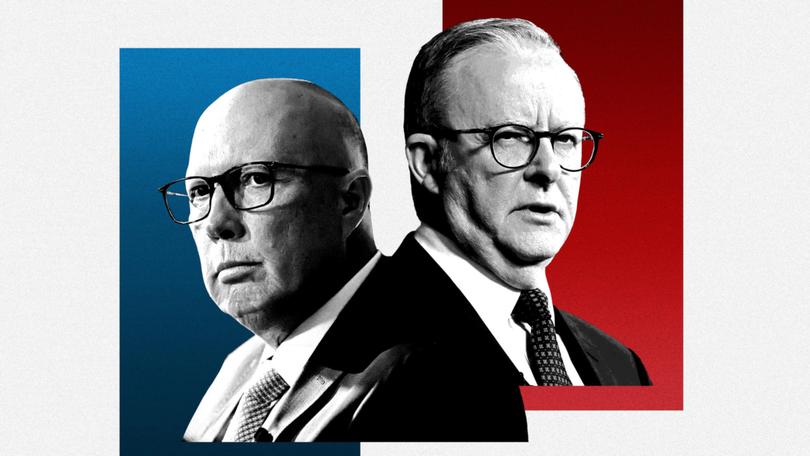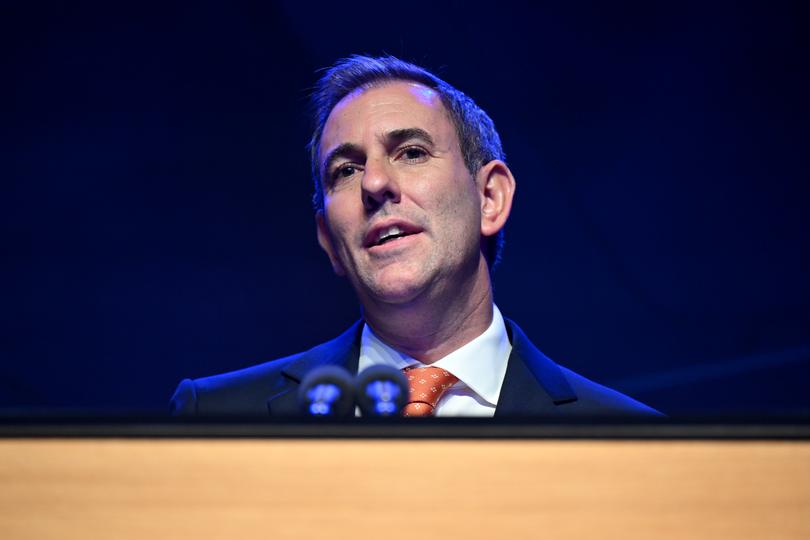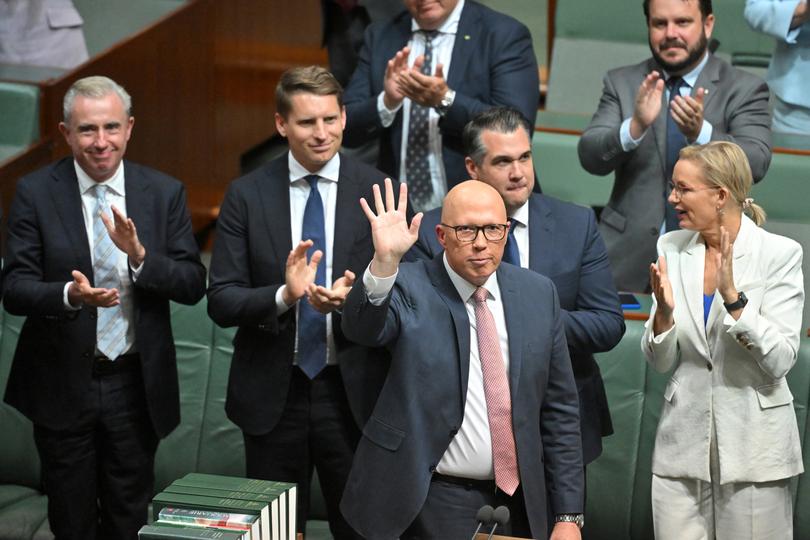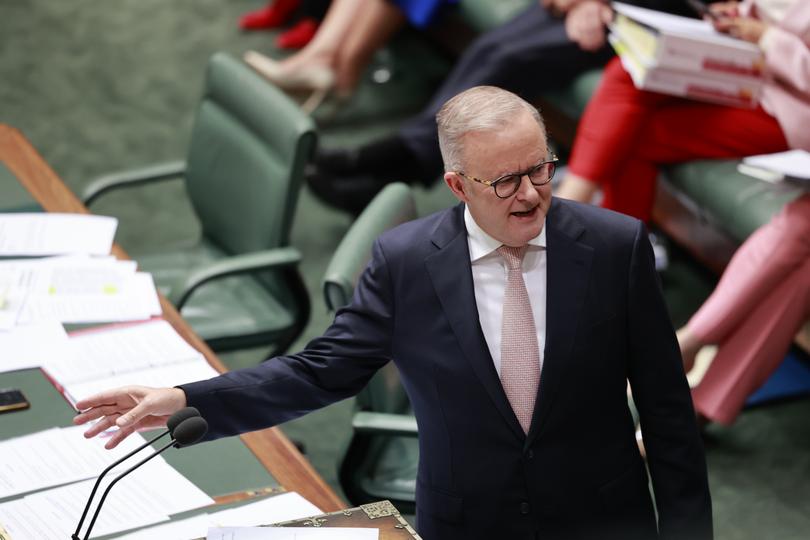PAUL MURRAY: Albanese and Dutton’s Federal election bargaining runs the risk of auctioning off our future
PAUL MURRAY: Rather than focus on the hard work of fixing our economy, Anthony Albanese and Peter Dutton seem determined to auction off our future for votes.

Labor’s tricky pre-election Budget, loaded to the gills with costly vote-for-me bribes and crushing debt, posed a seminal question: Can Australia’s political class be trusted with our future?
It’s a future where the old certainties no longer exist. Tomorrow has become a more dangerous place.
At a time of heightened sensitivities over Chinese expansionism, President Donald Trump shredded any sense of Australian national security by showing that America is no longer guaranteed to have our back.
Sign up to The Nightly's newsletters.
Get the first look at the digital newspaper, curated daily stories and breaking headlines delivered to your inbox.
By continuing you agree to our Terms and Privacy Policy.That was another big wake-up call for a country living beyond its means and not yet realising that its glory days are probably behind it, with Anthony Albanese presiding over the biggest fall in our living standards in history.
Against this uncertainty, Treasurer Jim Chalmers’ Budget was designed to lure us into a false belief that we can continue to fund a more comfortable present based on government handouts if we ignore what is needed to secure prosperity in the years ahead.
The lessons from the economic reforms of Hawke, Keating, Howard and Costello — and the latter’s remarkable run of 12 consecutive Budget surpluses — are being trashed.
This imminent Federal election will be a test of the nation’s maturity. And our ability to focus on important policy details.
Will voters accept Labor’s offering of endlessly damaging deficits, tempered by unsustainable social subsidies while national debt climbs, or are we prepared to buckle down to the hard task of economic repair needed to regain and enshrine the living standards we once expected as the norm?
Peter Dutton faced this dilemma as he prepared for Thursday night’s response to a Budget full of booby-traps, like tax cuts whose only true purpose was to serve as a political wedge.
Dutton had already matched big-spending Labor promises on more Medicare funding, cheaper medicines on the PBS and energy rebates totalling $11.5 billion, which was hardly encouraging.
The Opposition Leader went populist by offering in advance an even bigger election bribe than Chalmers’ tiny tax cuts — an immediate year-long halving of fuel excise, temporarily costing the Budget a third as much, but delivering around six times the cost-of-living relief to those affected.
It confirmed the election as little more than an auction on financial support, funded by selling off the future.
It was a measured attempt to seize back the political momentum.
Clever politicking, perhaps, but it confirmed the election as little more than an auction on financial support, funded by selling off the future.
Dutton’s formal reply on Thursday, poorly delivered, lacked the bold policy initiatives many conservatives had hoped he would unveil, particularly because he avoiding a direct attack on the mechanics of Labor’s flawed net zero renewables-only strategy, which has recklessly pushed up energy prices, without abandoning the 2050 objective.
He rolled out a gas reservation policy that should retail well on the east coast, providing a problem for Albanese because it was a Labor government that introduced the same measure in WA.

The promise of an as-yet undefined Energy Price Reduction Bill allows Dutton to expand on those themes during the campaign. And he wove his nuclear plan into the mix as a “visionary” policy whose time had arrived.
Dutton has clearly held back a lot, notably mentioning that a new defence policy would emerge over the next five weeks, reflecting the pressure coming from Trump for our military spending to lift rapidly to 3 per cent of GDP, something Labor is stupidly resisting.
And he revealed how he might pay for it in the real centrepiece to his speech about reining in Labor’s “inflationary, ineffectual, and imprudent spending measures”.
Chalmers’ spending was called out by AMP economist Shane Oliver in his Budget commentary, noting the Treasurer had been the beneficiary of $350b in unexpected revenues, like those from booming commodity prices.
In his first Budget, Chalmers had saved 90 per cent of the windfalls, but in this one he was spending 96 per cent of it.
That unrestrained spending is a sign of Labor’s desperation to hold on to power — and its disregard for the nation’s future.
“We will end the reckless $20b Rewiring the Nation Fund,” Dutton said on Thursday.
“We will stop the $10b Housing Australia Future Fund — under which not a single additional new home has been built.
“We will scrap Labor’s $16b of production tax credits over the next decade for critical minerals and green hydrogen. And we will reverse Labor’s increase of 41,000 Canberra-based public servants — saving $7b a year once in place, and well over $10b over the forward estimates.”

Those words effectively created a big war chest from “savings” into which Dutton can now roll out spending initiatives and still meet the costings requirements.
However, Dutton’s speech missed some vital targets he should have included. For instance, Chalmers’ tax-cuts Budget didn’t offer anything much to seniors, certainly not pensioners, or the unemployed — who all vote.
As ACOSS head Cassandra Goldie said on Tuesday: “We’re astounded that the centrepiece of tonight’s Budget is more dollars for everyone except those with the least.” Forgotten Australians.
And given the need to win more seats in WA, the Budget’s desultory deflection of this State’s infrastructure needs required Dutton’s attention. We got way less than our fair share.
Wide open was WA Treasurer Rita Saffioti’s unguarded suggestion of a side deal on road funding with Albanese after 2029, when neither Federal nor WA Labor is guaranteed to still be in power.
Labor is using handouts to mask the real economic picture.
But Dutton rightly kept the focus on inflation, which remains a political weak point for Labor. The Budget fine print tells the real story, if anyone wanted to go looking:
“The moderation in inflation has been assisted by cost-of-living relief and the decline in petrol prices around the end of 2024. Electricity rebates from Commonwealth and State governments and the additional indexation of Commonwealth Rent Assistance reduced headline inflation by 0.75 of a percentage point through the year to the December quarter of 2024.
“Without Commonwealth and State government electricity rebates, electricity bills would have been, on average, around 45 per cent higher in the December quarter 2024.
“The extension of electricity rebates in this Budget will directly reduce annual inflation by 0.5 of a percentage point through the year to the December quarter 2025.”
The obvious corollary is that the true inflation rate remains outside the Reserve Bank’s 2-3 per cent band. Labor is using handouts to mask the real economic picture.
So most Australians should expect power bills to spring back by somewhere around that 45 per cent figure when the handouts stop towards the end of this year.
It should be blindingly obvious by now that Australians found out all they needed to know about Anthony Albanese on election night three years ago.
In his first utterances, his priority for government was to give 3 per cent of the population privileges not enjoyed by the rest of the population — and he wasted more than a year finding out the nation disagreed.

It’s deteriorated from there. But Australians appear set to make a bad government worse by returning it in partnership with a handful of anti-Semitic and economically-illiterate Greens MPs holding Labor to ransom.
Younger Australians don’t see the dangers in that because they are blinded by their anxiety about climate change. They feel they can safely park a protest vote with the Greens.
However, the renewables strategy makes electricity unaffordable and everything they want to buy too expensive. Even the dimmest must realise that whatever we do here to cut our emissions will have no effect on “saving the planet” while Labor’s policy wrecks the country.
Harnessing that climate change alarmism is obviously behind the game Federal Labor is playing by delaying the extension of Woodside’s vital North West Shelf gas project.
It’s pretty clear Environment Minister Tanya Plibersek intends to dud Woodside, and that she and Albanese are playing “good cop, bad cop” until after the election.
Elections should centre on a government’s record on delivering what it promised at the previous poll, not about what new pledges it might or might not fulfil.
Albanese came to power on three main undertakings: to lower the cost of living (remember the $2 coin), bring down domestic power bills by $275 a year and enshrine the Uluru Statement of the Heart (in full), starting with a referendum on an Indigenous Voice to Parliament.
All three have been resounding failures.
Labor’s Budget was just more of the same from a government more interested in a return to power than the country’s future.
But Dutton’s response fell too often into the same category. He needs to improve in the campaign.
We also need to consider that our politicians are not solely to blame for this malaise.
Maybe Shakespeare got it right in Julius Caesar: “Men at some time are masters of their fates; the fault, dear Brutus, is not in our stars, but in ourselves.”
